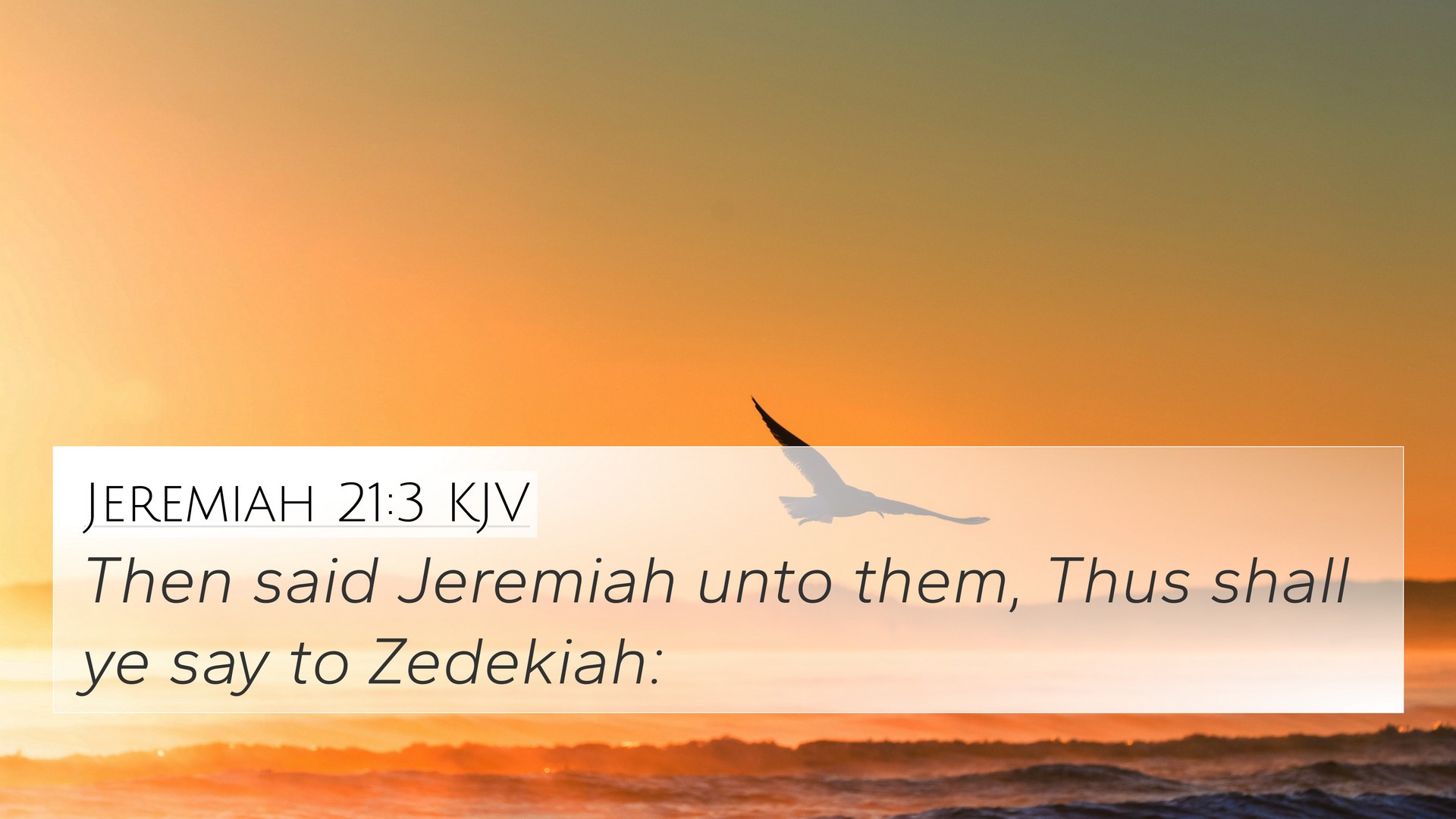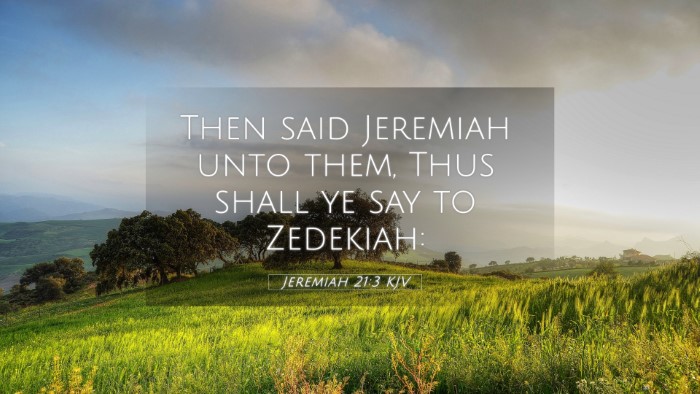Understanding Jeremiah 21:3
Jeremiah 21:3 states: "Then said Jeremiah unto them, Thus shall ye say to Zedekiah:" This verse is a significant bridge in the prophetic narrative of Jeremiah, where the prophet delivers God's message to King Zedekiah amidst the crises facing Jerusalem.
Contextual Meaning
This verse occurs at a critical juncture during the siege of Jerusalem by Nebuchadnezzar. King Zedekiah is desperate for divine intervention, and he sends a delegation to Jeremiah, hoping for a favorable word from God.
Insight from Matthew Henry
According to Matthew Henry, this verse illustrates the accessibility of God's word to leaders and the accountability that comes with it. Zedekiah's request reflects a broader human desire to attain God's favor in times of distress. The message Jeremiah was to deliver underscores the seriousness of their situation.
Perspective from Albert Barnes
Albert Barnes notes that this verse shows the interplay between divine sovereignty and human agency. Zedekiah's inquiry into God's will and Jeremiah's response highlight the necessity of turning back to God during dire circumstances. Barnes emphasizes that God's messages often bring not only warnings but also calls to repentance and hope.
Analysis by Adam Clarke
Adam Clarke expands on the historical context of this verse, noting that Zedekiah's reign was marked by rebellion and tumult. Clarke suggests that Jeremiah's role was pivotal in guiding Zedekiah, reflecting the principles of prophetic oversight over national affairs. The king’s request indicates a flicker of hope for divine assistance.
Thematic Connections
In this verse, we observe strong themes of request for divine guidance, prophetic influence, and the urgency of repentance. These themes resonate throughout the Bible, creating a rich tapestry of scriptural connections.
Cross-References for Jeremiah 21:3
- 2 Chronicles 36:12 - This verse discusses Zedekiah’s rule and highlights his choices leading to Jerusalem’s fall.
- Jeremiah 20:3 - Prior message from Jeremiah reflects his role as a prophet and the societal backlash he faced.
- Isaiah 1:18 - God's invitation to reason together, echoing themes of counsel and repentance.
- Jeremiah 37:3 - Zedekiah sending messengers to Jeremiah, showing ongoing reliance on the prophet.
- Lamentations 2:9 - Reflects the devastation of Jerusalem, a direct consequence of ignoring God’s warnings.
- John 16:13 - The role of the Spirit in guiding individuals into truth, complementing the prophetic ministry.
- Proverbs 3:5-6 - Encouragement to trust in the Lord with all your heart, relevant during crises.
Applying the Insights
Understanding Jeremiah 21:3 invites readers to contemplate the profound relationship between divine guidance and human action. The king's plea for insight from Jeremiah serves as a reminder that in times of uncertainty, seeking God's will is paramount. This verse emphasizes the enduring relevance of prophetic voices throughout history.
Conclusion
The lessons from Jeremiah 21:3 extend beyond ancient Jerusalem. They encourage contemporary believers to seek divine wisdom and to be attuned to the messages that God could provide through His word. Through various connections between Bible verses, we discern a consistent message of reliance on God, even amid turmoil.
Resources for Further Study
- Bible Concordance: Essential for identifying terms and themes related to Jeremiah 21:3.
- Bible Cross-Reference Guide: Useful for tracing thematic connections between prophetic texts.
- Cross-Reference Bible Study: Methods for digging deeper into how this verse relates to both the Old and New Testaments.
- Bible Reference Resources: Tools for locating similar verses and understanding inter-Biblical dialogue.
In summary, Jeremiah 21:3 serves as an entry point into a wider conversation about divine communication, the role of prophets, and the need for nations to turn to God in times of strife. This exploration can lead to greater insights on how to find cross-references in the Bible, enriching one's understanding of Scripture and its application.


